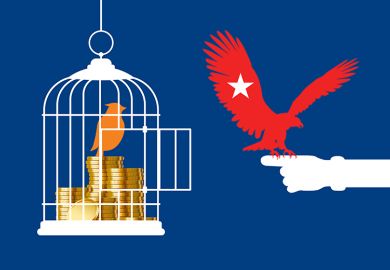A politics lecturer has alleged that he was forced to resign from a Turkish university after making a Facebook comment criticising government efforts to intimidate and silence academics.
Andrei Stavilă had recently been informed that his one-year contract at Muğla Sıtkı Koçman University, in western Turkey, would be renewed for two more years when, following the arrests and suspension of dozens of academics, he posted a comment condemning the state of Turkish academia.
Scholars at 89 universities have been threatened with dismissal and 30 have been arrested after Turkey’s president, Recep Tayyip Erdoğan, denounced the “treason of so-called intellectuals” who had demanded an end to what critics see as state violence in clashes with Kurdish rebels in southeast Turkey.
Although Dr Stavilă, who is from Romania, did not sign the controversial petition, he did leave a post on a UK-based academic’s Facebook page that contained an existing post condemning the erosion of academic freedom in Turkey.
In his message, Dr Stavilă criticised Turkey’s crackdown on academics as going “back to the dark ages”, saying that lecturers had faced threats for speaking out on certain issues.
Within two hours of posting the message, he was contacted by his head of department and warned that his contract might not be renewed by Turkey’s higher education board, known as YÖK, he said.
“I was told to think about my position over the weekend, and, on Monday morning, I told her [the head of department] that I would prefer to go,” Dr Stavilă told Times Higher Education.
“When I informed her, the decision to let me go had clearly already been taken by the rector’s office,” he added.
Nonetheless, Dr Stavilă, who gained his PhD at the European University Institute in Florence in 2013, was surprised that his department seemed so eager for him to leave immediately.
“It was only two weeks until the start of the new semester, and I was teaching four three-hour classes – it’s only a small department with five academic staff, so it’s hard to see how they will cover this,” he said.
Muğla did not respond to a THE request to comment on Dr Stavilă’s departure.
Dr Stavilă, who has now left Turkey, likens the situation in Turkish academia to that faced by Romania under the communist-era regime of the dictator Nicolae Ceauşescu.
“I was only 12 or 13 when the Ceauşescu regime fell, but my experience [in Turkey] reminded me of being told as a child not to talk about Ceauşescu or I would go to prison,” he said.
“When I started at Muğla, I was told not to talk about contemporary politics, which is amazing as I was teaching politics and international relations.”
He added: “Students would ask me about certain questions, but I told them that I was not allowed to talk about Turkish politics.
“People do talk politics, but only behind closed doors when they are sure no one is listening, which is very like Romania in the communist period.”
POSTSCRIPT:
Print headline: Turkey ‘reminds me of Ceaușescu’s Romania’, says exiled scholar
Register to continue
Why register?
- Registration is free and only takes a moment
- Once registered, you can read 3 articles a month
- Sign up for our newsletter
Subscribe
Or subscribe for unlimited access to:
- Unlimited access to news, views, insights & reviews
- Digital editions
- Digital access to THE’s university and college rankings analysis
Already registered or a current subscriber?




